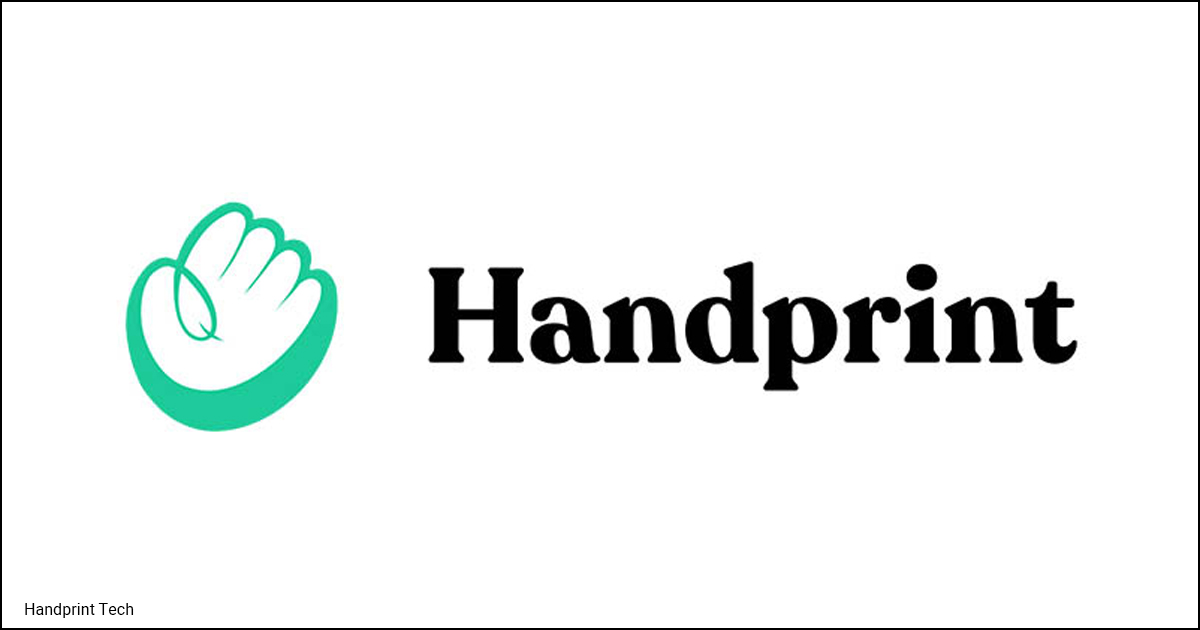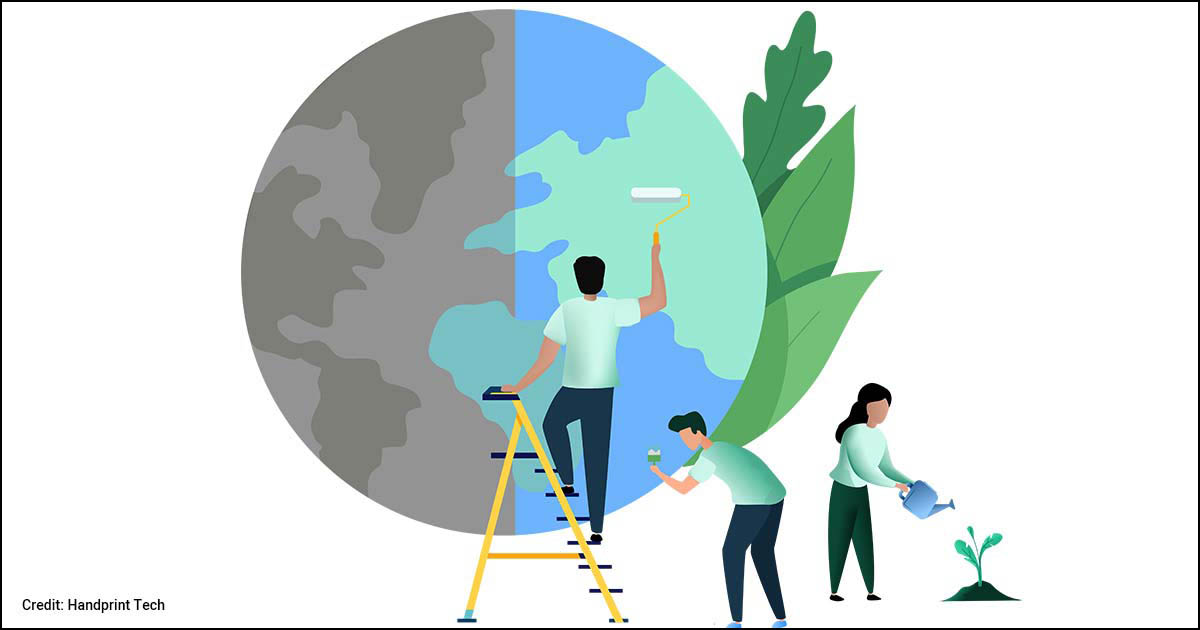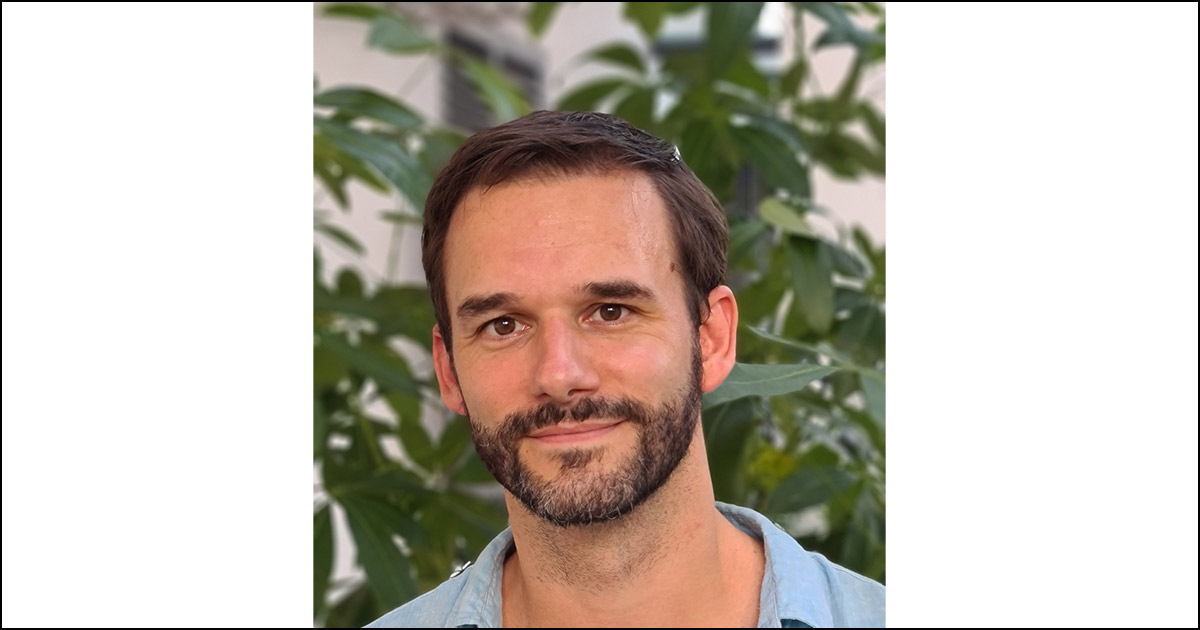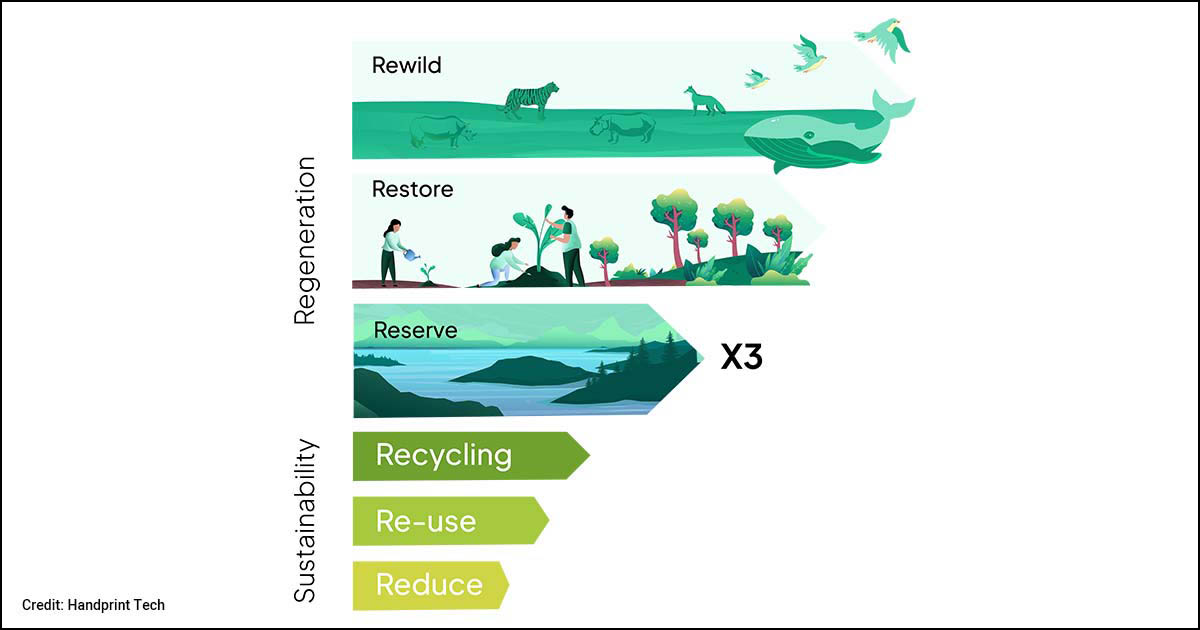Handprint Tech Profile

Last Updated: By TRUiC Team
Handprint Tech is a social, eco-friendly startup that works to connect companies with causes they care about to help them create a positive impact on the world around them.
Interview With Simon Schillebeeckx
Describe your product or service:
“Handprint offers ‘Impact as a Service’ by connecting companies to causes they and their customers care about. On the one hand, we curate diverse impact projects within the regenerative economy, focusing on habitat preservation, mangrove reforestation, coral reef reconstruction, and ocean plastic cleanups but fast expanding towards social impact as well. On the other hand, we create plug-and-play digital technology solutions that empower our B2B and B2C customers to integrate positive impact into their services. Our suite of solutions forms a modular sustainability toolbox from which companies can pick and choose components that align with their values and their value proposition.
Our first products have given us access to 2.75 million ecommerce stores worldwide giving us high-scalability potential. Now we are expanding our toolbox with various POCs in industries as diverse as banking, paper, hospitality, travel, transport, shipping, and electricity. The flexibility of our toolbox allows us to help companies integrate micro-contributions to positive impact projects into any kind of business process, customer touchpoint, or employee KPI.”
Describe your company values and mission:
“Handprint is on a mission to integrate positive impact into every business transaction.
Our values are BEST:
We are Bold
Because we are challenging the status quo and are motivating companies and people to become part of a revolution towards a restorative economy.
We are Empathetic
With our employees, customers, and their needs, and also with our wide network of stakeholders. We speak the language of NGOs and the language of corporate executives in CSR, marketing, and finance. Empathy is at the core of our product development process, we put ourselves in the shoes of our audience to develop great products.
We are Sustainable
As a social enterprise, we want to be financially sustainable and profitable, but we are driven by our mission to rewild the earth, restore and rebalance natural ecosystems, and contribute to the SDGs in all the markets in which we operate. We are also committed to be[ing] earth positive as a company. Our key success metrics are the amount of money we transfer monthly to our network of impact partners and our investors’ carbon return on investment.
We are Transparent
Through the tools that we build, we want to push the world to create better products and services. We are bringing financial transparency to the NGO world. Through the use of our mobile app, impact partners, even those that are unbanked, can confirm fund receipt so that we have a clear insight into how much money actually makes it to the communities on the ground. On top of that, we favor an open, evidence-based approach and publish the methods and vision behind our scientific work (e.g., regenerative responsibility calculator) so that those who want to scrutinize us, or help us improve, can do so.”
How are you funded? I.e. venture capital, angel investors, etc.
“We have raised a seed fund from friends, fools, and family.”
How big is your team? Tell us a little about them (I.e. co-founders, freelancers, etc.)
“Right now, we are 18 people, scattered all over the world. Our three founders currently reside in France, the US, and Singapore, making us truly a very tiny multinational [team]. The rest of the team is in India, Philippines, Singapore, and Portugal, while our impact partners are in Indonesia, Malaysia, Myanmar, Cambodia, the US, and the UK (so far).”
Did you always want to start your own business? What made you want to become an entrepreneur?
“I rolled into entrepreneurship almost accidentally. After working in sustainability consulting in Belgium for two years, I moved to the UK to pursue a Ph.D. in Innovation in 2011. I was fed up with working in industry because it simply did not challenge me enough. Fast forward to 2017, and I am an Assistant Professor at Singapore Management University, with a grant to do research on innovation in the natural world. This grant-funded a postdoctoral researcher for 18 months, but I struggled to find the right person until I met Ryan at a conference in the USA. He moved to Singapore, and we started investigating the most innovative, coolest Asian ventures that were working towards improving the natural world. This journey of discovery led us to Myanmar, where an NGO ran by a 78-year-old Norwegian had been experimenting with blockchain for funding mangrove reforestation and with drones to accelerate and scale [the] planting of trees. We were sold.
After returning to Singapore, Ryan set up The Global Mangrove Trust (GMT) and told me he'd made me a director. And suddenly, I was an entrepreneur.
About two years later, GMT started working with Mathias, a long-term friend of mine whose company specialized in R&D grants. He worked with us pro bono to help us write a large grant proposal, and that collaboration was so enjoyable that we decided to set up a venture to scale some of our ideas. Handprint was born.”
How did you come up with your startup idea? How did you decide to actually act on the idea? What gave you confidence that you were on the right track?
“The key question we asked was why [don't] more companies do something that is actually good for the world? Our tentative answers were that doing good did not create enough value for most companies, that it was difficult, and that many companies may want to do something, but they do not know where to start. After some market research, these answers seemed to be pretty correct, so that's what we tried to solve. We went digital because we really started working on Handprint during the COVID-19 lockdown in Singapore and then turned to ecommerce because it was the main way people were buying stuff during that period.
Our CEO Mathias was instrumental in really getting us moving. He was so convinced about what we are doing he left his job and started working full-time on Handprint very quickly.
Our initial confidence that we were on the right track probably came from the friends and business angels we approached. I think we approached about 35 people, and 31 decided to invest.”
How did you come up with your company name? Did you have other names you considered?
“Originally the company was called The Greeen Company. This was because Mathias had a previous startup called Greeen Design that was creating a smart and beautiful system for plants. That company did not work out, so we inherited the name ... but we could not register that name in Singapore as there was already a company called The Green Company (with two instead of three E's).
Because we focus on the creation of positive impact, we ended up choosing the name Handprint as the opposite to Footprint, which is the sum of a company's or an individual's negative impact on the planet.”
Feeling inspired? Learn how to launch your company with our guide on how to start a startup.
What is the greatest challenge you faced in starting your business, and how did you overcome it?
“Getting our [minimum viable product] ready for market testing was probably the hardest thing we have done so far. It has taken us a long time, and it took hiring an entire team of developers and lots of trial and error to get to where we are now, but it was a valuable learning experience.”
Who is your product or service made for? Who is your target market?
“Our first product vertical is specifically for ecommerce. Shopify, WooCommerce, and Magento users can use our ecommerce plugin to make their estores regenerative. The target market is, in theory, all ecommerce stores in the world, but we focus on fashion, cosmetics, apparel, and sportswear because this area has lots of entrepreneurs who care deeply about environmental impact. Now we have API implementations that enable us to integrate with any ecommerce store, regardless of the system they use, so that gives us more flexibility and the ability to work with larger platforms as well.
As our toolbox is becoming more flexible, we can now integrate with very different types of business processes such as emails, RSVPs, bookings, [and] advertising. So, our target market is probably too big: any kind of company that wants to support the regeneration of the natural world. This is expected to be an $8.1 trillion market by 2050, so we have plenty of room to grow.”
What's your marketing strategy?
“A combination of cold emails, LinkedIn outreach, social media videos and images, articles and blog posts, and speaking at events and podcasts. As a startup, our biggest constraint is capital, so we need to be very cautious in how we spend money and measure the returns on advertising and sales spend as closely as possible. We continuously tweak our messaging and the platforms where we advertise to optimize for attracting ecommerce stores to our platform.”
What are the key customer metrics / unit economics / KPIs you pay attention to to monitor the health of your business?
“Like every SaaS platform we measure CAC and CLTV but our core impact metrics are the dollar amount of funding we send to impact partners, the carbon return on investment for our investors, the number of inbound and outbound signups, and the number of new impact partners we onboard on the platform.”
What's your favorite entrepreneurial book and podcast?
“Book: ‘The 4-Hour Workweek’ [by Tim Ferriss].
Podcasts: ‘Pivot,’ ‘Masters of Scale,’ ‘Reversing Climate Change,’ and of course the ones I have appeared on like ‘Agile Sustainability,’ ‘Green Pulse,’ ‘Toasted Earth,’ and ‘Silicon Valley Tech & AI’ with Gary Fowler (last two forthcoming).”
What is the biggest lesson you learned during your journey?
“Building high-quality enterprise-grade software is a lot harder than I initially thought. When I used online services, I never even thought about this before, but now I see the complexity of features and design a lot more. I also learnt that there is [a] very big difference between teaching business model innovation (as I do at university) and actually doing it in practice.”
Who is your support system?
“My wife, my babies, my Handprint colleagues, and my friends. And nature, sometimes just going out to nature reminds me why we are doing this in case I need the reminder.”
How do you stay motivated?
“I believe what we do at Handprint is incredibly important and that Handprint can become a keystone player in the regenerative economy. I have two children, and I'd like them to live in a world that is not constantly plagued by natural disasters. Other than that, running a startup is simply exciting, even very mundane things can be exciting because of what they could mean for the overall goal of the company.”
Did you have to develop any habits that helped lead you to success? If so, what are they?
“Work hard. Ask questions. Don't take criticism personal[ly]. Take yourself out of the equation if the task is something you cannot add value to. Keep on top of your emails and track your agenda. Be positive, especially with employees, and be honest with your co-founders.”
What are you most proud of as an entrepreneur?
“I'm honestly not sure. I am hoping that whatever I will be most proud of is still to be developed and achieved.”
Do you have any recent news on your company that we can feature on our Google News platform?
“We have just been accepted in the SMU-BIG Innovation Program and are shortlisted for Startup Bootcamp Australia.”
Recommended:
- Keep up with more startup companies by visiting our list of the top startups to watch.
- Hear startup stories from real founders on the Startup Savants podcast.
- Form your own startup by reading our review of the best online incorporation services.
Tell Us Your Startup Story
Are you a startup founder and want to share your entrepreneurial journey withh our readers? Click below to contact us today!
More on Handprint Tech

Every Business Can Be Sustainable With Handprint
Handprint, a greentech startup founded by Mathias Boissonot, Ryan Merrill, and Simon Schillebeeckx, offers businesses an easy and effective way to increase their sustainability.

Insights From the Founder of Eco-Friendly Startup Handprint
We were fortunate enough to hear some valuable insights during our interview with Simon Schillebeeckx of eco-friendly startup Handprint that will inspire, motivate, and teach aspiring and established entrepreneurs alike.

5 Ways to Support Greentech Startup Handprint
We have developed this list of five creative and impactful ways to support greentech startup Handprint.


